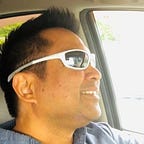The Unexpected Lesson I learned from Top Gun’s Maverick (Game Changer)
My kid used this psychological hack for a breakthrough in basketball
After a disappointing basketball game, my kid’s coach told him, “I see potential in you, you can make those three-point shots, I don’t know why you don’t take more shots.”
There was a long pause.
The coach then asked, “do you believe in yourself?”.
My kid shook his head. He was just being honest. Tears were welling in his eyes. As a dad, I was broken too.
On our way to our hotel, I asked him if he already watched the movie “Top Gun”. He said no, and asked why?
I continued to tell him the scene when a lady instructor, who was asking Maverick regarding a successful maneuver in training. The idea was the instructor was trying to breakdown the maneuver and asked why and what was Maverick thinking when he executed the maneuver.
Maverick said, “When you’re up there, you don’t think.”
“You think and you’re dead”, Maverick added.
My kid, listening intently to the story, asked “What about it? Why not think?”.
That was the opening that I needed.
Later, I’ll tell you what this psychological hack is.
— — — — — — — — — — — — —
During the Vietnam war, the kill ratio of dog fights between the American and the Vietnamese was around 2:1. That means for every two enemy aircraft down, one American aircraft is lost. Some say that there was a time when it was 1 to 1.
It was dismal.
You are losing a $30 M aircraft in every encounter. You are not even counting the pilot lost and the wingman involved.
Top brass from the Navy where force to look for answers, and fast.
The answer was the establishment of the Top Gun, boringly known but officially known also as the United States Navy Strike Fighter Tactics Instructor program (SFTI).
Top Gun was set up in 1969 at Naval Air Station Miramar in California. It’s like the ultimate training ground for Navy fighter pilots.
The whole point?
To give these pilots some seriously advanced combat skills and tactics so they can totally own the skies in any battle.
In the movie, it was portrait as the training ground for the best of the best, the cream of the crop. The story revolves around Maverick vying for the best pilot of the class, against Iceman (Val Kilmer).
But what really struck me was the scene when Charlie, played by Kelly McGellis, asked Maverick of a certain maneuver during a dog fight simulation.
You have to understand that the whole point of the Top Gun program was to understand the top pilot in the world. Charlie, who played as a civilian instructor, who have a Ph.D. on this kind of work, was trying to dissect what Maverick did.
The maneuver was not in the book. But Maverick explained that he doesn’t think anymore when he did it.
“You think up there, you’re dead”, Maverick explains.
I explained to my kid, “if you think too much in basketball, you’re dead too”.
The expertise of Maverick is described, in psychological terms as “unconscious competent” — You just do what you do.
Don’t let the technical jargon throw you off balance, but in order for you not to think anymore in those maneuvers, you have to be in the zone of “unconscious competent”.
Unconscious competent only means it’s second nature to you, or for Maverick in this matter.
Here’s the kicker though, you have to be conscious competent first before you become an expert.
What does it mean? It only means that you have to be conscious first of the right thing that you need to do. When a person learns a language, like a toddler learning how to say “mommy”, the baby says “ma” first then “mee”.
Conscious competent requires a lot of energy.
The baby consciously repeats the syllables, again and again, consciously.
Remember when you first learn how to drive?
Whan I did, I experienced this: I have to think which pedal is for the brakes, for acceleration, look at the side mirror, while thinking where to go next.
That requires a lot of energy and attention. You have to think.
But as you progress, you can even drive while texting, which I don’t recommend.
But my point is, you need to expend energy to think. And you have to do it again and again, to be second nature to you.
My kid bought my idea, and said, “ok, I need to think and force myself to think.”
Pause.
“And I need to do it again and again, before it becomes second nature”.
